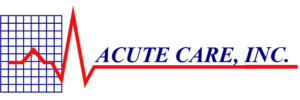
ACUTE CARE, INC.’s CMS-Compliant Quality Assurance Program
Context: A CEO at a partner facility was reading through the revised instructions to surveyors and took note of an option to outsource an aspect of quality assurance to a service provider. Upon investigation, it became apparent that ACUTE CARE, INC.’s Performance Improvement services, a value-added feature of our partnership, closely matched the requirements outlined in the document.
The Center for Medicare and Medicaid (CMS) includes in its Survey Protocol for Critical Access Hospitals (see reference, below), the following:
| The Critical Access Hospital (CAH) has an effective quality assurance program to evaluate the quality and appropriateness of the diagnosis and treatment furnished in the CAH and of the treatment outcomes.
“An effective quality assurance program” means a QA program that includes: • Ongoing monitoring and data collection; • Problem prevention, identification and data analysis; • Identification of corrective actions; • Implementation of corrective actions; • Evaluation of corrective actions; and • Measures to improve quality on a continuous basis. |
The protocol includes mention of both a facility wide program and “services provided to the CAH under contract” (see below, emphasis added). It is this subset of the program that we will address.
| There is nothing in this requirement to preclude a CAH from obtaining QA through arrangement. Whether the CAH has a freestanding QA program or QA by arrangement, all of the requirements for QA must be met. If a CAH chooses to have a freestanding QA program, the QA program should be facility wide, including all departments and all services provided under contact. For services provided to the CAH under contract, there should be established channels of communications between the contractor and CAH staff. |
Source: Interpretive Guidelines §485.641(b)State Operations Manual, Appendix W – Survey Protocol, Regulations and Interpretive Guidelines for Critical Access Hospitals (CAHs) and Swing-Beds in CAH’s. Rev, 200, 02-21-20)
https://www.cms.gov/Regulations-and-Guidance/Guidance/Manuals/downloads/som107ap_w_cah.pdf
ACUTE CARE, INC. provides, as part of its value-added services portfolio, quality assurance collaborative assistance, reporting and counseling that address each of the requirements listed in the protocol.
“An effective quality assurance program” means a QA program that includes:
- Ongoing monitoring and data collection;
ACUTE CARE, INC.’s Quality Indicator Dashboard program, and elective services, provides a mechanism to collect, record, and trend key performance indicators.
- Problem prevention, identification and data analysis;
Data from the Quality Indicator Dashboard, Transfer Analysis Form, patient experience survey data, and other issues associated with opportunities for improvement and praise form the backbone of a collaboration between the facility leadership team and ACUTE CARE, INC.’s Performance Improvement and Client Services teams.
- Identification of corrective actions; Implementation of corrective actions; Evaluation of corrective actions;
The aforementioned dialogue, collaboration and exchange of ideas allows for the identification of opportunities, objectives associated with initiatives that are part of a Plan of Corrective Action, an assigned timeline for implementation, and identification of responsible parties.
- Measures to improve quality on a continuous
ACUTE CARE, INC. partners with the facility team to respond to compliance obligations, publicly reported data, system improvements, new protocols and policies, and best practices that apply to the department and the facility as a whole. We work with the facility team to set goals, benchmark, and transmit the rationale for the initiative to our physician partners.
ACUTE CARE, INC. is proud of our partnership with facilities in maintaining compliance with Federal requirements set forth in Medicare Conditions of Participation (CoP), and believe that our commitment to best practices and continuous quality improvement is one facet of this commitment.

Chief Operating Officer